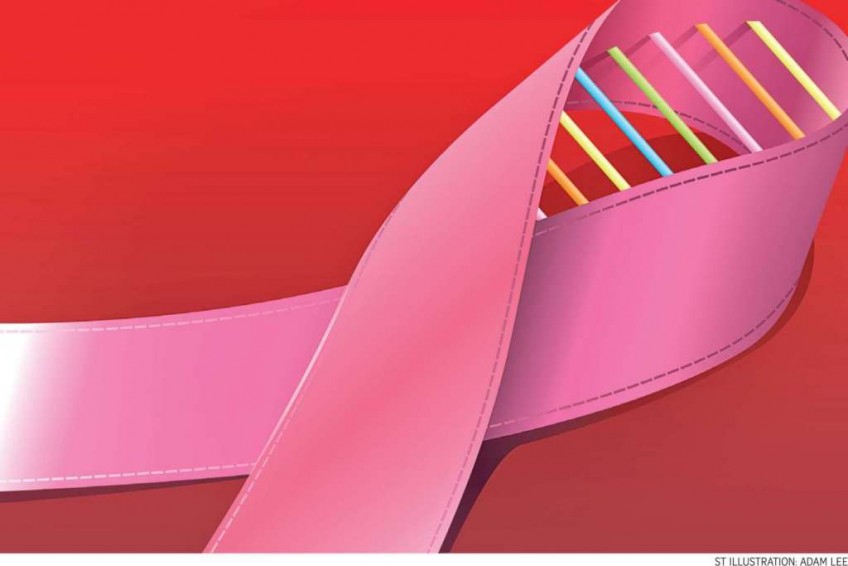Dad's genes matter in breast cancer

I met Amy (not her real name) and her husband for the first time six months ago at the cancer genetics clinic of the National University Cancer Institute, Singapore (NCIS).
She had been diagnosed with cancer of the right breast and was receiving chemotherapy to shrink the tumour before surgery.
The doctor who saw Amy at that time suspected that she might have a hereditary predisposition to cancer.
Amy is 37 years old. Several of her family members had breast cancer at a fairly young age - a paternal aunt had the disease at age 35 and a paternal first cousin died of breast cancer at 45.
Most people who develop breast cancer have the sporadic kind of cancer, which means that the disease is a one-off event and does not run in the family.
However, about 10 per cent of breast cancer patients have an inborn genetic mutation that can be passed from generation to generation.
A celebrity with such a mutation is Hollywood actress Angelina Jolie, who is cancer-free but had chosen to undergo preventive removal of her breasts and ovaries to reduce her risk of getting cancer.
Some clues that a patient may have hereditary breast cancer include young age when diagnosed with cancer (below 40); having many family members with breast cancer; having male family members with breast cancer; and having family members with breast and ovarian cancer.
THE FATHER'S SIDE MATTERS
"I don't understand why cancer in my father's side of the family should matter," Amy had said at our first consultation.
What she has raised is a common misperception - that paternal family history is not important when determining if one may have hereditary breast cancer.
This is not true.
So far, all the genes that are known to cause hereditary breast cancer are located in non-sex chromosomes. This means that gender does not play any role in the inheritance of the gene mutation.
A person may inherit a cancer gene mutation from either of his parents, and he has an equal chance (50:50) of passing the bad gene to a son or daughter.
As genetic testing can yield sensitive information that affects not just the patient but also family members, genetic counselling is crucial for patients to appreciate the benefits and risks of genetic information before actual testing.
Identifying a genetic mutation in a patient and his family members can help them understand their cancer risk so that they can plan screening and preventive measures.
However, the information can potentially cause conflicts among family members who feel differently about genetic information, and evoke negative feelings such as guilt and depression.
It may also affect insurability and employability in otherwise- healthy individuals.
"I will go ahead and do the test," Amy had said after the genetic counselling session. "The test results can guide me in my treatment decisions. I also want to know for the sake of my two daughters."
The test showed that Amy carries a deleterious mutation in the BRCA2 gene, which explains her young-onset cancer.
It is most likely that she inherited the mutation from her father.
PREVENTIVE STRATEGIES
Three months later, Amy underwent surgery to remove both her breasts, followed by implant reconstruction.
She also underwent keyhole surgery to remove her ovaries and reproductive tubes at the same time.
These procedures slashed her risk of developing another round of breast cancer by 90 to 95 per cent, and cut her risk of developing ovarian cancer by 80 per cent.
Three different specialists at the NCIS - a breast surgeon, plastic surgeon and gynaecologist - coordinated the operations.
Amy has shared the test results with her 32-year-old sister, Cheryl (not her real name), who was tested and found not to have inherited the same mutation.
This is good news, although it does not mean that Cheryl will not develop breast cancer.
She may still develop sporadic breast cancer and should start doing a surveillance mammogram at 40, the same age at which all women with a normal risk of developing breast cancer are encouraged to do.
•Dr Lee Soo Chin is a senior consultant at the Department of Haematology-Oncology at the National University Cancer Institute, Singapore (NCIS), which is part of the National University Health System.
She specialises in breast cancer treatment and directs the cancer genetics programme at NCIS.

This article was first published on Dec 27, 2016.
Get a copy of The Straits Times or go to straitstimes.com for more stories.